On Wednesday, August 29, Finance Minister Arun Jaitley challenged Rahul Gandhi on accusations the Congress president and his party have made about the purchase of 36 Rafale fighter aircraft for 7.85 billion euros after an agreement between then French president Francois Hollande and Prime Minister Narendra Damodardas Modi in April 2015.
Jaitley posed 15 questions to Rahul Gandhi.
Ajai Shukla places Jaitley's questions and the Opposition's charges placed alongside each of them.
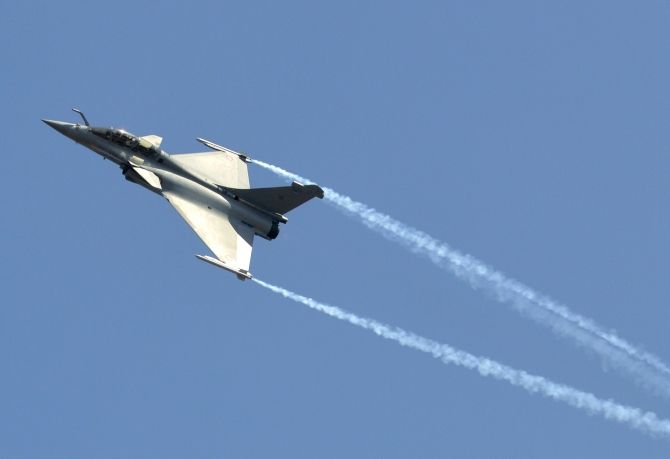
Jaitley's question
1. The United Progressive Alliance suffered from decision-making paralysis. Wasn't the decade-long delay in the Rafale purchase due to UPA's incompetence and indecisiveness?
Opposition's charge
There was no 'decade-long delay.' From 2004 to 2007, the Indian Air Force framed the fighter's requirements; from 2007 to 2011, the IAF conducted flight tests and only in 2011 did the IAF select the Rafale and Eurofighter. In 2012, the Rafale was found cheaper and price negotiations began with Dassault. The role of the government began only in 2012.
Jaitley's question
2. Did the UPA's delay compromise national security, given the IAF's urgent need for fighters?
Opposition's charge
If the UPA's delay had compromised national security, why did the NDA wait for more than one year before buying the Rafale in 2015? In fact, security was compromised by reducing the number of Rafales from 126 (in the UPA tender) to just 36, and doing away with the 'Make in India' component.
Jaitley's question
3. Was the UPA's failure to buy the Rafale motivated by 'collateral considerations' like in Bofors?
Opposition's charge
The UPA did not buy the Rafale, so there is no question of bribes. If there are questions of 'collateral considerations', they relate to Anil Ambani, and how he mysteriously replaced Hindustan Aeronautics Ltd in the deal.
Jaitley's question
4. How has Rahul Gandhi given contradictory figures for cost of the Rafale: Variously Rs 700 crore, Rs 520 crore, Rs 540 crore and Rs 526 crore.
Opposition's charge
Why is the government refusing to release the real figures, both of Dassault's 2007 bid and the cost of the current contract. The defence minister had vowed to release the figures, but then backed off, citing a secrecy agreement with France, which does not even apply to commercial aspects.
Jaitley's question
5. Is the Congress aware of the Rafale price that Dassault quoted in 2007 in its winning (L-1) bid? An escalation clause in that bid would have raised the price until the last fighter was delivered. Has forex variation been considered?
Opposition's charge
The Rafale price in Dassault's 2007 was hinted at by then defence minister Manohar Parrikar, who said in April 2015 that 126 Rafales would cost about Rs 90,000 crore. That comes to Rs 715 crore per aircraft. Why is the government refusing to release the real figures?
Jaitley's question
6. Is the Congress aware that, comparing basic aircraft price, along with the escalation clause, the NDA has signed the deal at a price 9 per cent cheaper than what the UPA would have paid?
Opposition's charge
In the absence of official figures from the government, the deal price of Euro 7.8 billion for 36 fighters indicates a far higher cost than what the government claims – a multiple of more than three times higher.
Jaitley's question
7. Can Rahul Gandhi deny that, adding on India-specific adaptations and weaponry,would have made the 2007 L-1 price at least 20 per cent higher than what the NDA negotiated in 2016?
Opposition's charge
The India-specific enhancements are a fiction, meant to hide the full cost of the Rafale. The Joint Statement issued in Paris by Prime Minister Narendra Modi and French President Francoise Hollande in April 2015 mentions that 36 fighters would be in the same configuration as the 126 fighter tender of 2007.
Jaitley's question
8. Can Rahul Gandhi deny that the total contract cost of 2016, with add-ons, future supplies and maintenance, is more favourable than the 2007 L1 offer?
Opposition's charge
The cost agreed to by the government in 2016 is far higher than the 2007 bid. In that respect, it contradicts the Paris Joint Statement of April 2015, which pledged a contract at a more favourable price.
Jaitley's question
9. Can Rahul Gandhi deny that the Government of India has no contract relating to the Rafale with any private industry?
Opposition's charge
All 36 Rafales will be supplied fully built "and there is no manufacturing of these 36 aircrafts in India." In abandoning the "Make in India" component of the 126-fighter tender of 2007, where 108 fighters were to be built by HAL, the NDA government has surrendered a great opportunity to build up India's aerospace industry. These fighters should have been built in India.
Jaitley's question
10. Foreign Original Equipment Manufacturers (OEM) under the UPA's own offset policy can select their own Indian offset partners and the Indian government has no say in this.
Opposition's charge
The Offset Guidelines give the defence minister the responsibility to approve all offset contracts. Besides, it is no coincidence that Dassault has abandoned HAL and chosen Anil Ambani, who is known to be close to the BJP.
Jaitley's question
11. Is Rahul Gandhi aware that there are two ways of acquiring defence equipment -- either competitive bidding or through an Inter-Governmental Agreement (IGA)?
Opposition's charge
There is a laid down procedure for approving an IGA. This was not followed at the time Modi announced in Paris in April 2015 that he had asked France to supply 36 Rafale fighters.
Jaitley's question
12. Can Rahul Gandhi deny that the UPA itself had in 2007 shortlisted the Rafale as technically- acceptable and L1 in price competition?
Opposition's charge
The Opposition has no quarrel with the selection of the Rafale. It was a mistake to bring down the numbers from 126 to just 36 fighters, leaving the IAF short of numbers.
Jaitley's question
13. Can Rahul Gandhi deny that the urgency of defence requirement caused New Delhi and Paris to 'execute the supply of 36 Rafale aircraft at terms better than the 2007 offer of the UPA?'
Opposition's charge
The contract for 36 Rafales was concluded on highly unfavourable terms and at a far higher cost than the 2007 offer.
Jaitley's question
14. Can it be denied that both the Price Negotiation Committee and the Contract Negotiation Committee negotiated for 14 months before concluding the deal?
Opposition's charge
The cost that was agreed upon was unfavourable to India.
Jaitley's question
15. Can it be denied that before the deal was executed, the Cabinet Committee on Security (CCS) approved the transaction?
Opposition's charge
The CCS did indeed approve the transaction before the contract was signed in 2016, but no CCS approval had been taken by Modi before his joint statement with Holland in April 2015, which committed India to buying 36 Rafales.




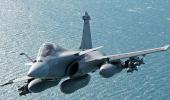



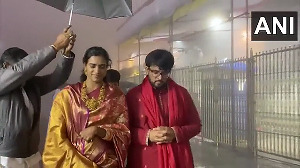
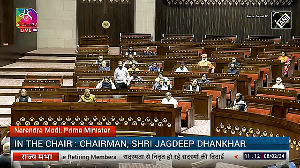
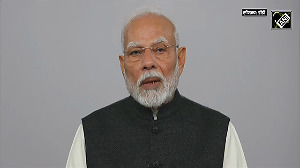
 © 2024 Rediff.com -
© 2024 Rediff.com -